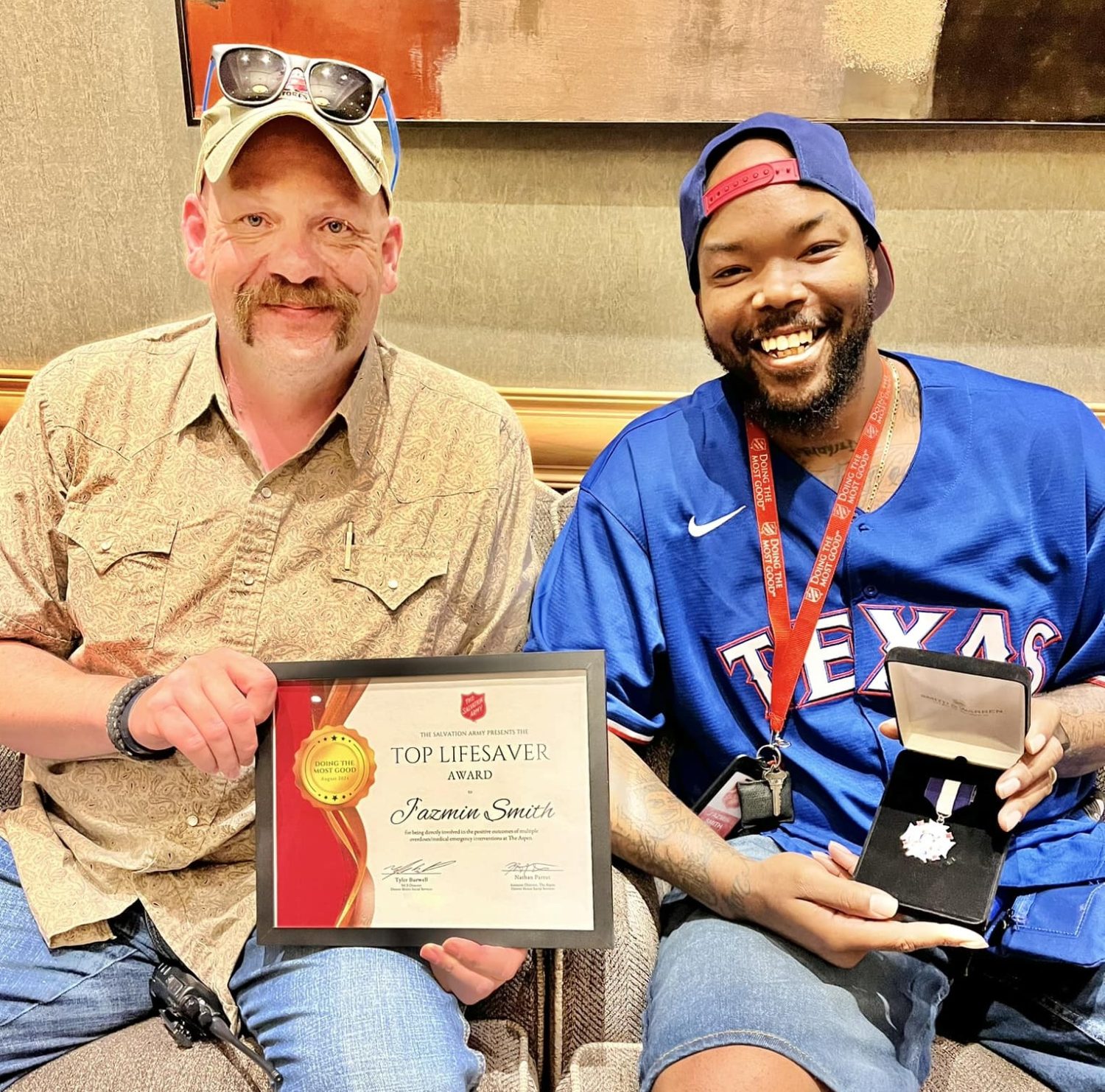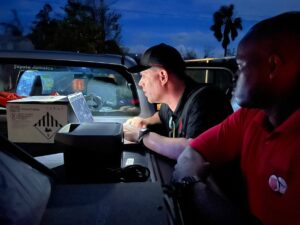Just weeks after accepting an administrator position at The Aspen, a low-barrier shelter operated by The Salvation Army in a converted Denver-area hotel, J’azmin Smith saved someone from an overdose for the first time in his life.
Then it happened again—and again—until nine months later, he had saved 15 individuals at the shelter by administering Narcan, a medication that reverses opioid overdoses.
“It soon became second nature to just get to that person in need,” Smith said.
His efforts earned him a Lifesaver Award from The Salvation Army and a Pulse Award from Cintas, a company that trains staff at The Aspen in CPR, first aid and automated external defibrillators (AEDs).
Nathan Parrot, Assistant Director at The Aspen, said that the shelter’s operation in an area with high drug use has proved instrumental in offering aid and support to those at risk of overdose.
“With Narcan, AEDs and trained staff available, we can respond rapidly to an overdose,” Parrot said. “The Aspen’s location is critical because it’s serving a community where overdoses are already occurring.”
Parrot noted that clients undergo bag checks to prevent substances from entering. However, as a low-barrier shelter, sobriety is not required.
“He’s incredible with our clients. Everyone in this building sees that he cares and trusts him.”
Nathan Parrot, Assistant Director at The Aspen
All staff members at The Aspen carry Narcan and walkie-talkies, and Narcan is fully stocked in the offices for clients to request. Parrot said the effectiveness of Narcan in each overdose case points toward the use of fentanyl and other opioids.
According to the CDC, fentanyl was involved in over half of all overdose deaths across the U.S. in 2019, and by 2022, it accounted for nearly 70 percent of all drug overdose fatalities.
Data released by the CDC in August 2024 indicated a 10 percent decline in opioid-related deaths in the U.S.—the first significant drop in over a decade.
While experts have not yet determined the exact cause of this decrease, research from the National Institute on Drug Abuse suggests overdose education and naloxone (Narcan) distribution (OEND) play a considerable role in reducing overdose deaths.
The Aspen opened in December 2023 to provide housing support for individuals experiencing homelessness. Each client meets with a case manager before being connected to a housing navigator.
Recognizing that some individuals face challenges with substance use, the shelter prepares to respond to overdoses and provides an on-site medication-assisted treatment clinic. Parrot said when an overdose occurs in or near the building, Smith often takes the lead in responding.
“He’s incredible with our clients,” Parrot said. “Everyone in this building sees that he cares and trusts him.”
In his role, Smith supervises the shelter’s operations by walking through all five floors each day. He knows every client’s room number, first name and story.
“I can look at someone and know if they may be at risk of an overdose,” Smith said, noting they may appear confused and quiet or start to lose color.
If staff members haven’t seen someone during meal times, they conduct a wellness check.
“It gets emotional because you realize how fragile life is,” Smith said. “But that motivates me—knowing I can make a difference in someone’s life.”

When an overdose is reported, the team collaborates to administer reversal methods while other staff members call 911. The shelter then partners with Stout Street, a drug treatment facility, to provide any medical follow-up for the client.
Parrot noted that the following steps vary for each individual, but many clients continue to receive support from The Aspen.
“If somebody overdoses on site, I would rather bring them back in the building and get them connected to resources than discharge them,” Parrot said.
He said many clients leave the shelter after housing navigators help them secure permanent housing. They then receive support with moving and acquiring furniture for their new homes.
When a couple who had been living at The Aspen moved into a new apartment in September, they requested Smith’s assistance.
“They were a little nervous and felt most comfortable with him helping them,” Parrot said. “He’s like a friend to everyone; he’s very well-liked.”
Smith said earning the trust of others provides him with all the reasons he needs to keep saving lives from overdose.
“Some people experiencing homelessness or addiction think no one will care about them because of their situation,” Smith said. “I tell them right away that I care.”
He said that sometimes, simply smiling and taking the time to sit and talk to someone can go a long way.
“I tell people: ‘Just because right now is bad, tomorrow can be better,’” he said.
Do Good:
- Get the Do Good Digest. (Because you’re human and hopeful.) Join 26k+ people who know even the smallest actions add up to make a big difference and get weekly inspiration sent right to your inbox.












